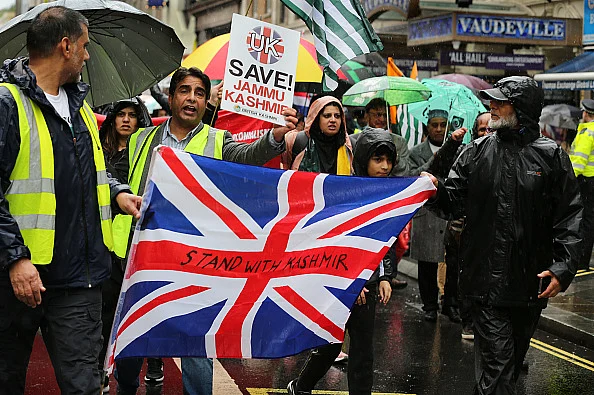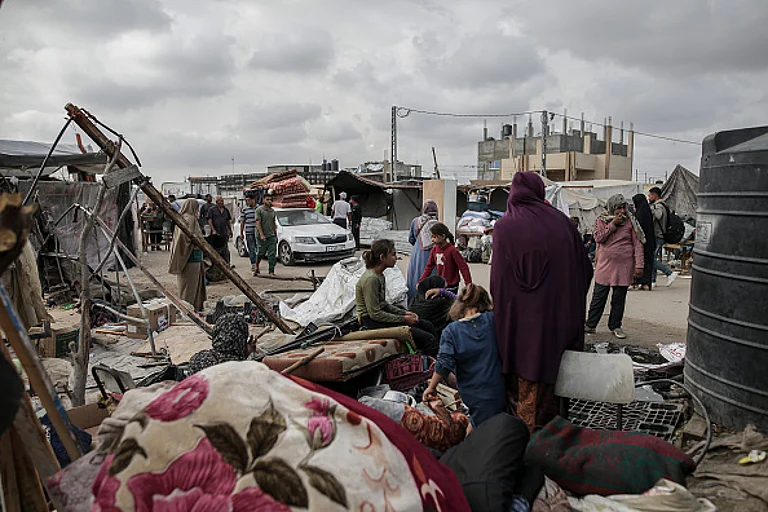Once a major international issue, Kashmir has now fallen off the radar. The silence of the people of Kashmir is matched by that of the international community. So much so that in 2019 when India scrapped Kashmir’s special status, there was hardly a whimper from the major powers. Imran Khan who was then Pakistan’s Prime Minister certainly tried his best to get the world involved but the response was lukewarm. Saudi Arabia and the UAE, the two countries that had in the past staunchly backed Pakistan on Kashmir, were reluctant to do so. "Silence of the world over Kashmir is deafening,’’ Pakistan’s army chief Asim Munir acknowledged last month.
A Lukewarm International Response To The Kashmir Question
Kashmir no longer resonates with the international community as it had in the past.

"Kashmir has not been on the global agenda for quite a while. I think there has been fatigue with the issue. Also when you have multiple fires burning around the world, Kashmir is not really the top priority for any country,’’ says Harsh Pant, vice-president at the Observer Research Foundation (ORF).
The prism through which the Kashmir issue was looked at in the past was primarily through the lens of India. With India’s increasingly strong diplomacy globally, the issue was seen through the lens of Pakistan, Pant explains. Primarily, Pakistan was creating the problem. Particularly with the use of terrorism in Kashmir, whatever the cause might have been, it derailed the momentum in favour of separatism in Kashmir. This increased in the aftermath of 9/11 when there was hardly any space for the use of violence. "Broadly as India has risen in the global hierarchy and as Pakistan has become marginal in global consciousness, the Kashmir issue has also become an issue that India has to settle within its own domestic, political, and Constitutional framework. Appetite for Kashmir on the global stage had disappeared,’’ says Pant.
Kashmir no longer resonates with the international community . International politics is not static, the shifting kaleidoscope of power equations and strategic interests determines the support or interest for a cause for major powers. Much of this is Realpolitik and has little to do with the rights of people fighting for justice. The self-interest of world powers, the movers and shakers of international politics is finally what counts.
Kashmir and Palestine are two of the longest unresolved international disputes, though successive governments in New Delhi, whether led by the BJP or Congress believe that Kashmir is a done deal and there is no question of reopening the issue of plebiscite. Kashmiris won’t agree with this assumption.
"It is of course true that long-running conflicts are often ignored by the international community when they seem to be low level or geographically contained, and command international attention when they are acute, with a large loss of life,’’ says Radha Kumar writer and analyst.
"But I wouldn’t say that Kashmir no longer resonates internationally. There was a great deal of international concern over the removal of special status and division and demotion of the state - the issue was debated by the UN Security Council too - but Putin’s war on Ukraine, the terrorist attack on Israel, and its horrifying war on Gaza and expansionism in the West Bank naturally occupy international concern,’’ she explains.
Like Kashmir, Palestine too was conveniently forgotten so long as the violence was contained. But after the Hamas attack on Israel on October 7 and Israel’s ongoing war in Gaza, the world could not continue to shrug off the problem. Today it is a burning question and talk of the two-state solution is resounding worldwide, though it is doubtful whether the destruction of Gaza and the death of 36,000 people will finally lead to a peace plan that recognises a full-fledged Palestinian state.
"In the West, Kashmir is less discussed partly because of the decision taken by the US about twenty years ago to end efforts to mediate between India and Pakistan on the issue. As a result, the dispute is less salient, although the conduct of both Indian and Pakistani security forces in the area remains a concern for international human rights groups,’’ says Ian Hall, professor of International Relations at the Griffith Asia Institute."Yes, the de-emphasising of Kashmir was part of the de-hyphenation in the early 2000s and it has persisted since. Of course, the US still discusses human rights in Kashmir in annual State Department reports. But it has dialed down the public criticism over the past twenty years. To be frank, while strategic considerations are a big factor, the other one is a recognition that the US has little capacity to shape what India does in Kashmir,’’ Hall explains.
At a time when the Cold War was at its peak, and Pakistan was vital for the US to fight the Russian army in Afghanistan, international focus on Kashmir was unrelenting, thanks to Pakistan. India was in the opposite camp though not formally a part of the Eastern Bloc. At that time US and its Western allies were prone to believe Pakistan’s narrative on Kashmir.
That changed gradually. India’s 1991 economic reforms, the steady growth of the Indian economy since then and India’s huge market potential changed the equation. Pakistan’s misadventure in Kargil, when Bill Clinton wagged a finger at Nawaz Sharif and openly sided with India. The rapprochement between India and the US that began during Vajpayee’s tenure eventually led to the India-US civil nuclear deal signed between Manmohan Singh and George W. Bush. The US did some heavy lifting to get the International Atomic Energy Agency (IAEA) to accept India’s nuclear status, despite initial opposition by China. Since then the relationship has grown from strength to strength. The rise of China and the US-China rivalry has given India an added edge.
Washington is allowing India a lot of leeway, despite frustration at New Delhi refusing to condemn Russia’s aggression on Ukraine or the decision to continue buying Russian oil despite sanctions slapped by the US and its allies. Much of Washington’s soft-pedaling of India is because India provides a counterweight to an increasingly aggressive China. India is part of the Quad, the US, India, Japan, and Australia grouping in the Indo-Pacific aimed at containing China.
How valid is Pakistan’s claim that India broke its international obligation to hold a plebiscite in Kashmir?
"It is true that India was under obligation to agree to a plebiscite. In 1953 Nehru and Pakistan's new Prime Minister agreed to hold a plebiscite and Nehru started looking for a plebiscite administrator from a neutral country,’’ says K. P. Fabian, retired diplomat and analyst. "Incidentally, the reason for promising a plebiscite was to prevent the Nizam from claiming that he was competent to proclaim independence without ascertaining the people's wishes. The decision to offer a plebiscite was taken by Nehru and Patel. The latter had once communicated to Jinnah that he could take Kashmir and leave Hyderabad alone,’’ explains Ambassador Fabian. He adds that the then US Secretary of State John Foster Dulles persuaded President Eisenhower to sign a defence treaty with Pakistan and US started supplying arms to Pakistan. Nehru decided not to proceed with the planned plebiscite following this move.
Now after nearly seven decades, India is in no mood to reopen the Kashmir question. Instead there is talk now of taking overPakistan Occupied Kashmir, that India believes is its territory. This could be a part of the BJP election rhetoric but any attempt to change the current Line of Control will not be easy. The international community will then not keep quiet. Pakistan and China can join hands to resist such an attempt.
Yet within the current parameters, New Delhi has to show more heart. A silent but angry people is not the answer to Kashmir’s problems. As Radha Kumar points out: "The conduct and results of the current Indian elections, especially in Kashmir, are being keenly watched internationally. I am sure that the holding of state elections in Jammu and Kashmir will be as keenly watched. International observers will then watch for the restoration of statehood and whether any degree of peace prevails on the ground.’’
The government has promised elections. If it conducts free and fair polls there is a chance that the situation will improve. Silence as we know does not mean consent.
- Previous Story
 Marburg Virus Outbreak In Rwanda Leaves 11 Dead | All About The Deadly Ebola-Like Virus
Marburg Virus Outbreak In Rwanda Leaves 11 Dead | All About The Deadly Ebola-Like Virus - Next Story


























